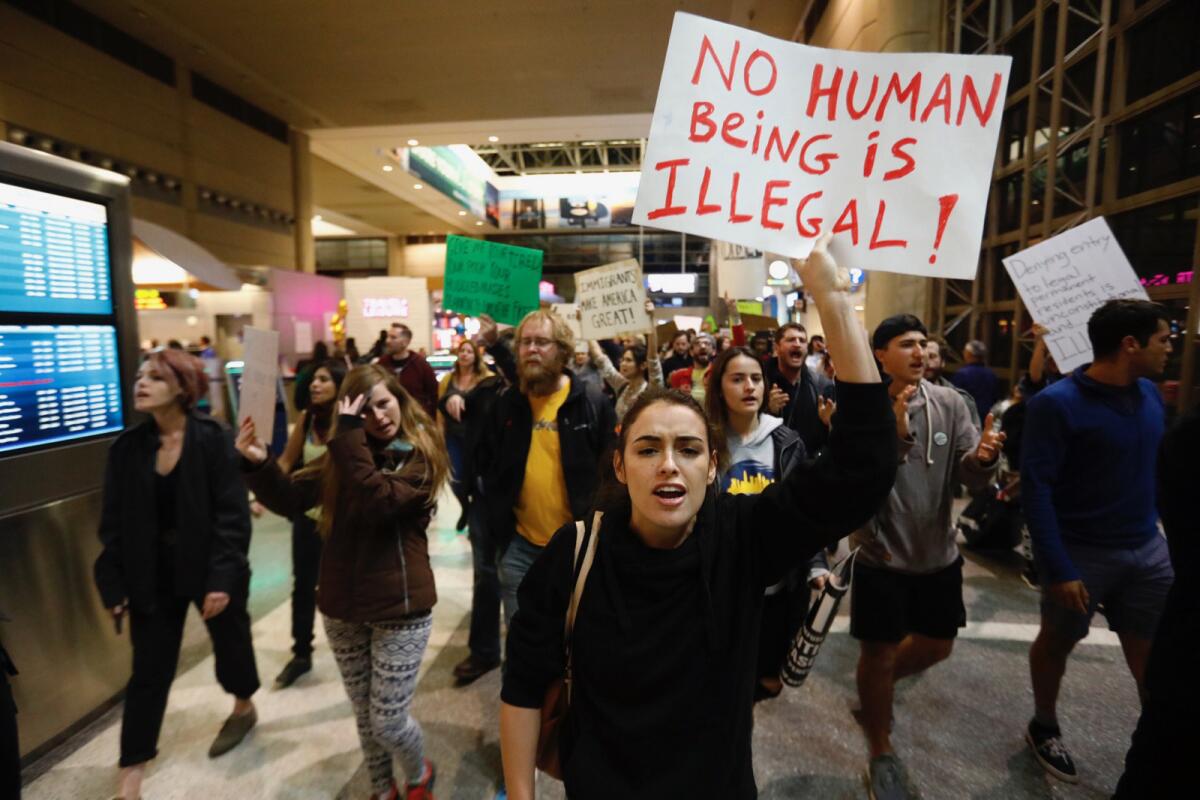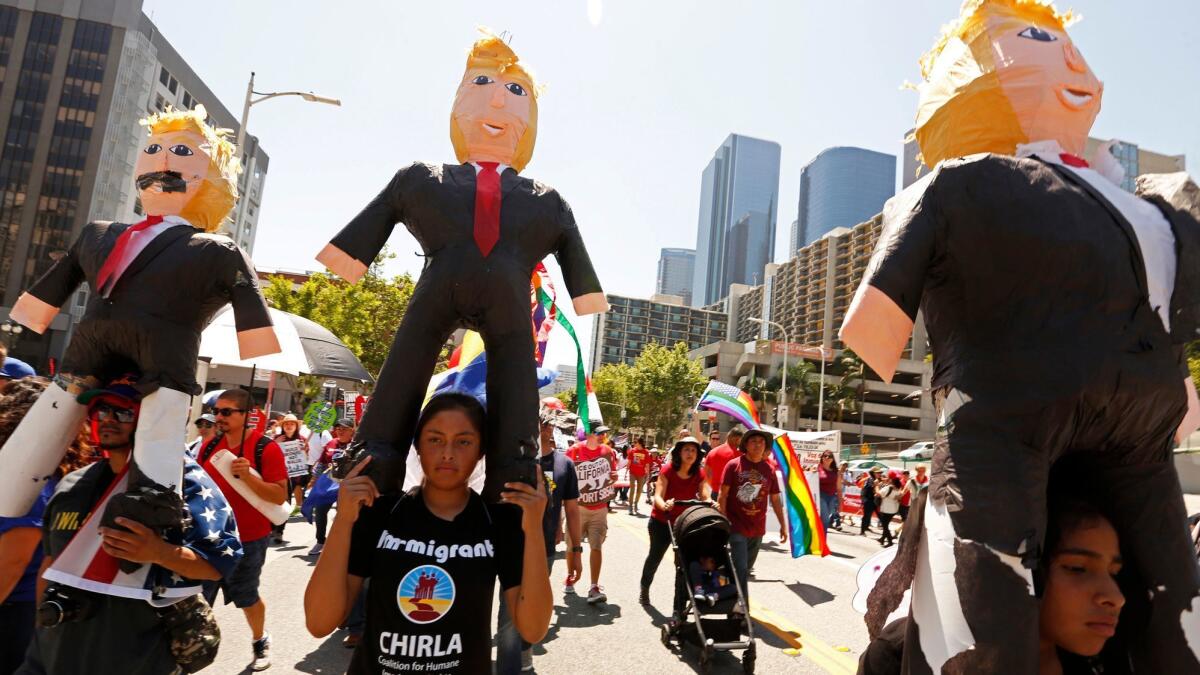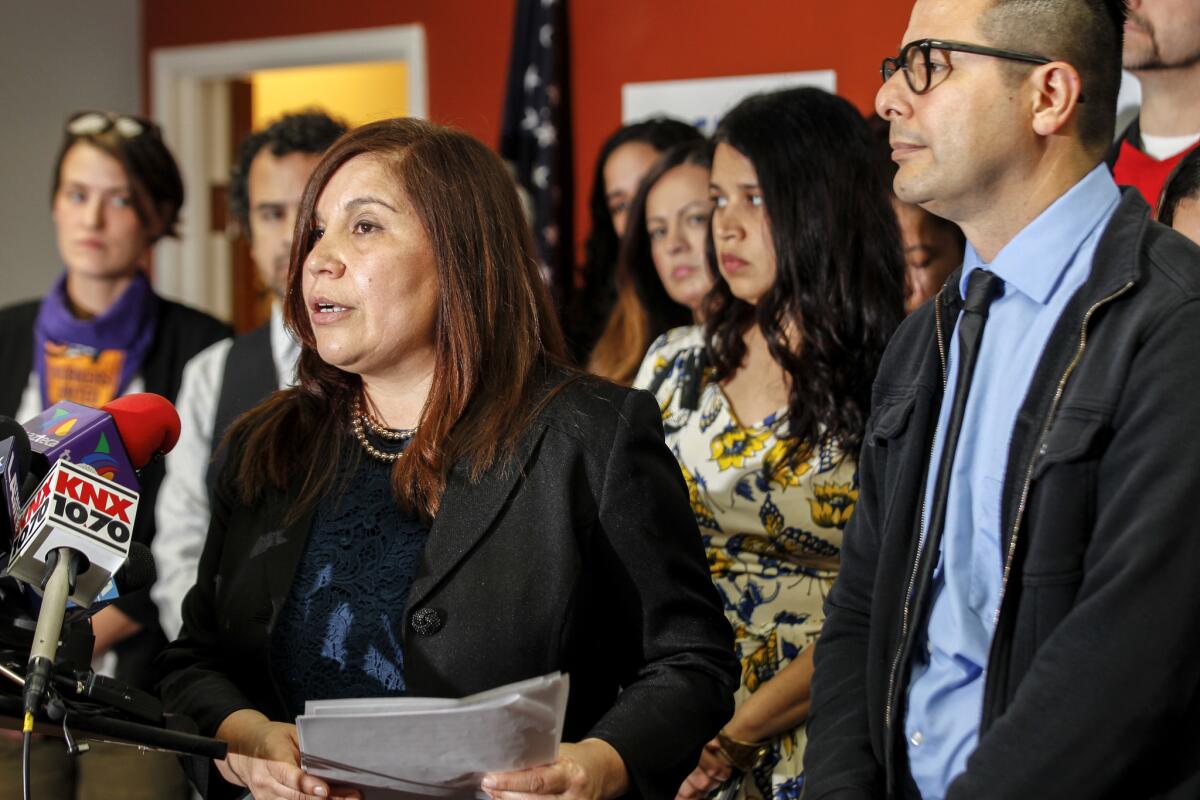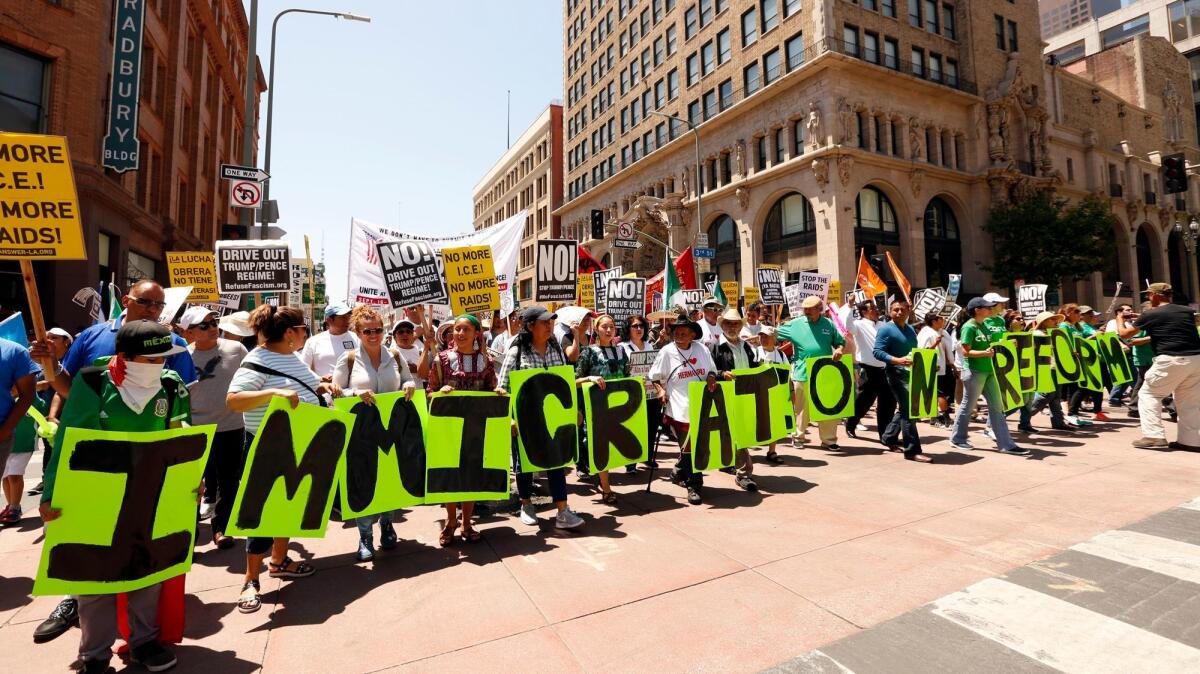Hereâs why some immigrant activists say not even criminals should be deported

As President Trump continues to vow to come down hard on illegal immigration, supporters of immigrants find themselves at odds over how much to fight for those whose criminal history is fodder for advocates of harsher and broader crackdowns.
L.A. County became an early flashpoint in the debate after officials â in response to fears of mass deportations â unveiled a $10-million fund to hire lawyers to defend local immigrants without legal status.
Some activists believe that not only should the L.A. Justice Fund help all immigrants but that no one should be deported â not even those convicted of violent crimes.
That position puts them at odds with others â including Democratic politicians in California and many immigrants themselves â who support deporting those convicted of violent and more grave crimes, which was a long-standing policy embraced by President Obama.
Those others want to focus their efforts on preventing deportations of people who simply came to the country for a better life.
âI donât think thereâs a member of Congress â Republican or Democrat â who believes that if somebody commits an egregious crime, that they shouldnât be deported,â said Rep. Tony Cardenas (D-Los Angeles), the son of Mexican immigrants. âPublic safety is a very important issue to all of us.â
L.A. Councilman Gil Cedillo, a key figure in the successful push to allow immigrants who are in the country illegally to get driverâs licenses in California, said there are people who should lose the privilege of remaining in the U.S.
âI donât want one person taken away from their family,â he said. âBut thatâs different from narco-traffickers or people who are engaged in sex trafficking. And I donât know how you would try to defend that.â
Cedillo argues that the Justice Fund doesnât deny anyone their due process rights. Rather, he said that because it canât subsidize the cost of legal representation for all immigrants facing deportation, leaders decided not to extend it to those who engage in âuniversally heinous acts.â
For activists like Pablo Alvarado, executive director of the National Day Laborer Organizing Network, deportation even of convicted criminals ends up sowing chaos in places with weaker criminal justice systems such as Mexico, Honduras, Guatemala and El Salvador. And that, he said, causes more people there, including victims of crime, to flee those countries.
âIâve been in El Salvador and in Honduras when the planes land with deportees,â Alvarado said. âItâs becoming the penal colony of the United States where criminal dumping is acceptable.â

Itâs a position with far more currency among activists than many of the immigrants they advocate for â something evident during the May Day rally Monday that saw thousands of people march to downtown L.A.
While many people carried signs demanding no more deportations, immigrants interviewed expressed reluctance to be lumped in with those convicted of serious crimes. Sitting on a grassy knoll outside City Hall, Rosa Alvarez, 66, said she had no problem with immigrants in the country illegally being deported if they had extensive or serious criminal histories.
âGet rid of the bad ones, I say. Deport the criminals and leave the rest of us alone, the ones who are working and donât do anything,â Alvarez said.
Nearby, Christian Hernandez, 25, and his mother, Lydia Hernandez, 57, said they came to the march as a way to challenge Trumpâs anti-immigrant rhetoric.
Christian, a beneficiary of the Obama administrationâs immigration relief program known as Deferred Action for Childhood Arrivals, or DACA, said he and his mother have been in the U.S. since 1998 and have no criminal records. He said immigrants who commit violent crimes make people like him look bad and should be removed.
But like many immigrants and activists, Christian Hernandez said Trump has stirred racism by broadly painting immigrants in the darkest tones.
âThe minute he decided to say weâre all criminals and rapists, it was like a bucket of cold water being thrown at you,â he said.
For some activists, though, simply getting rid of the âbadâ ones is more complicated than it sounds. They point out that the Trump administration has already broadened the definition of âcriminalâ and also highlight cases of immigrants being detained and deported after minor infractions or after being caught up in raids targeting others.
Though crime in the U.S. is much lower than it was a generation ago â when there were far fewer immigrants in the country illegally â Trump has successfully rallied many supporters by focusing on immigrants who have committed violent crimes.
Angelica Salas, executive director of the Coalition for Humane Immigrant Rights of Los Angeles, believes all deportations should be suspended until the immigration system is reformed.
âWeâre deporting people without a single penny to their name into abject poverty or homelessness, many of them back to places they havenât known,â she said. âThese people are products of our society.â
Jorge Gutierrez of the L.A.-based LGBTQ group Familia: Trans Queer Liberation Movement, said there will likely be more pronounced disagreements over which immigrants to defend if the Trump administration hires thousands more Border Patrol and Immigration and Customs Enforcement agents and becomes more aggressive over whom it targets.
âHe hasnât put the whole infrastructure together,â Gutierrez said of Trump. âSo once he does, itâs going to create more deportations. And in all of that, this narrative, the tension, is going to become more visible among who is pushing to protect a few and who is pushing to protect everybody.â

For many conservatives, there is no debate: Everyone in the country illegally should eventually be deported, they say.
David Ray, communications director for the Federation for American Immigration Reform, said deportations should be prioritized with criminals at the top of the list. FAIR keeps a running list of serious crimes committed by people who lack legal status.
âThe principal of American fairness is based on the fact that nobody is above the law,â Ray said. âIf we fail to enforce the immigration laws, then people stop respecting them.â
Early in his presidential campaign, Trump called for the deportation of all 11 million immigrants estimated to be in the country illegally. But he has also expressed sympathy for DACA recipients, often called âDreamers.â
While polls have shown that most Americans are against mass deportations, a 2016 CNN/Kaiser Family Foundation poll found that 55% of Trumpâs strongest supporters â whites without college degrees â think everyone lacking legal status should be removed.
Alex Nowrasteh, an immigration policy analyst at the Cato Institute â a libertarian think tank based in Washington, D.C. â said he understands the ethical point that groups like the National Day Laborer Organizing Network are making. But he said removing people who commit violent or property crimes is whatâs best for everyone in the U.S.
âPart of the deal when you come to this country is youâre going to abide by serious laws,â he said. âThere needs to be serious punishment for breaking that beyond just serving time in prison.â

The Trump administrationâs immigration guidelines significantly broaden the definition of who is considered a criminal, making nearly all immigrants in the U.S. illegally susceptible to deportation. Last month, the Department of Homeland Security unveiled a new office to help people victimized by âcriminal aliens.â
According to a Homeland Security report from 2013, there were 1.9 million âremovable criminal aliens,â a figure that includes immigrants here illegally, those with temporary visas and legal permanent residents. The number of immigrants with criminal records who are here illegally is unclear, though the Migration Policy Institute calculated in 2015 that it was about 820,000. The think tank estimated 690,000 of those people had felony or serious misdemeanor convictions.
California state Senate leader Kevin de LeĂłn (D-Los Angeles) has introduced a âsanctuary stateâ bill that would expand policies prohibiting state and local law enforcement agencies from using resources to investigate, interrogate, detain or arrest people for immigration enforcement purposes.
After changes to the bill, federal immigration officials would be notified when felons who have violent or serious convictions are released, and a recent amendment to the bill would require the state parole board or the Department of Corrections and Rehabilitation to give ICE a 60-day advance notice of the release date of inmates who have been convicted of a serious or violent felony, or those who are serving time for a nonviolent crime but have a prior conviction for violent or serious crimes.
Alvarado, of the day laborer network, said he knows that deportations will continue â and that his belief that criminals should not be automatically removed is hardly shared by most immigrants. But heâs undeterred.
âAs an immigrant, I love this city as much as I love the village where I come from,â he said. âItâs racist to think that itâs not OK for rapists and murderers to do their actions here, but itâs OK to do them in El Salvador and Guatemala.â
Nowrasteh, of the Cato Institute, said those that hold the most hard-line positions on either side of the debate over deportations are likely to be disappointed in the end.
âI donât think weâll ever get to a point where aliens who commit serious crimes will be allowed to stay,â he said, ânor will we see a day where the government rounds up 12 million people and ships them out of here.â
Times staff writer Ruben Vives contributed to this report.
ALSO
O.C. sheriff wants to expand immigration detention
In a California farm town, the border is just a line that must be crossed every day
Feds say they didnât deport âDreamer,â but acknowledge error on his DACA status
More to Read
Sign up for Essential California
The most important California stories and recommendations in your inbox every morning.
You may occasionally receive promotional content from the Los Angeles Times.










